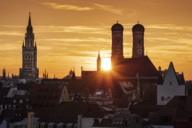
Tourism in Munich has progressively recovered last year. A total of 16 million overnight stays were registered in Munich’s accommodation establishments with ten or more beds. This is twice as many as in 2021 and 88 per cent of the overnight volume of 2019. Arrivals amounted to 6.9 million, around 80 per cent of the 2019 result.
The demand significantly started to pick up after the Easter holidays. The development was particularly strong in the third quarter. Here, even the results of 2019 were exceeded. Almost all market segments showed a clear recovery, with the DACH markets (Germany, Austria, Switzerland) being the driving force. The summer sparked the desire to travel, and a large number of high-profile events, such as major concerts, the European Championships, trade fairs and the Oktoberfest, attracted guests to Munich. August saw the best result for an August since the beginning of data collection, with 1.8 million overnight stays (2019: 1.7 million). In September, a total of 1.7 million overnight stays were registered, 40,000 more than in 2019.
“We have overcome the low and reached almost 90 per cent of the overnight volume from before the pandemic. This is a very good result and better than we had expected at the beginning of the year. The results also reflect the resilience of Munich as a destination. Events such as the big concerts at the exhibition centre, the European Championships and, of course, the Wiesn (Oktoberfest fairground), as well as the NFL game have become a major tourist attraction. This shows that such events play a central role for the tourism industry. Yet, success in tourism cannot be taken for granted. It will take a joint effort by Munich's tourism industry to meet the challenge of 2023."
Almost 60 per cent of overnight stays were generated by guests from the domestic market. At 9.4 million, the number of overnight stays was on par with 2019 (9.5 million), despite the weak first quarter.
A total of 10.3 million overnight stays were registered from the German-speaking markets of Germany, Austria and Switzerland, which is 64 per cent of the total overnight volume and 33 per cent more than in 2019 (7.7 million). This means that these source markets are of the greatest importance for Munich as a destination.
A total of 6.6 million overnight stays from abroad were recorded, which is around 75 per cent of the volume in 2019 and 175 per cent more than in the previous year.
The most important foreign market is the USA. With 1 million overnight stays, this market has almost reached the level of 2019 again (1.2 million).
In general, the remote markets are very restrained and still have not yet reached the pre-Corona level. Exceptions, besides the USA, are the Arab Gulf States and Southeast Asia, which are also among the top ten foreign markets.
| 1. | USA | 1.040.199 |
| 2. | Italy | 485.199 |
| 3. | Switzerland | 424.264 |
| 4. | Austria | 418.782 |
| 5. | Great Britain | 416.308 |
| 6. | Arab Gulf States | 380.754 |
| 7. | Spain | 292.584 |
| 8. | Scandinavia | 264.314 |
| 9. | South East Asia | 240.423 |
| 10. | France | 231.436 |
At the end of 2022, a total of around 94,500 beds in 461 establishments were available in Munich (2019: 88,000 beds in 470 establishments). The room occupancy rate was just under 60 per cent and thus clearly no longer reached the occupancy level of 2019 (75 per cent). Room revenues averaged 77.74 euros (2019: 94.53 euros).
Guests stayed longer in Munich in 2022 (2.31 days) than in 2019 (2.09 days), but slightly shorter than in the two years marked by the pandemic (2020: 2.35 days, 2021: 2.57 days).
Forecasts for the tourism year 2023 are difficult to make. Challenges such as inflation, high energy costs, skills shortages, the war in Ukraine, and - with a clear downward trend - Corona need to be conquered. They could contribute to a possible reduction in travel volumes in 2023.
However, the current surveys and pre-booking figures certainly give reason for a more optimistic outlook.
The desire to travel among guests from Germany, Munich’s most important market, has increased again compared to 2022. Currently, 92 per cent of Germans are planning a trip in 2023. In a survey a year ago, only 75 per cent indicated they would travel.
Business travel is becoming increasingly important as a tool for staff retention and recruitment. Companies that offer their employees the possibility of business trips have an advantage as a business location. This is the finding of a study by the Fraunhofer Institute.
An increase in passenger numbers of around one third is forecast for Munich Airport for the year 2023, from which Munich is expected to benefit mainly from international arrivals.
According to expert estimates, Munich tourism in 2023 will just reach the 2019 level of 18.3 million overnight stays.
München Tourismus is the city’s central tourist organisation and is part of the City of Munich’s Department of Labour and Economic Development. München Tourismus works with its business partners in the private sector and the tourist organisation München TIM e.V. to develop marketing and PR campaigns and tourism products in a bid to establish Munich as a destination on the international travel market. The strategy for achieving this aim is defined by the Tourismuskommission München, a joint undertaking between the city council and the local tourist industry.
Annual performance stats for 2022 (PDF)
Printable photos for tourism reporting about Munich are available for download at www.munich.travel/film-and-photo-service
Press contact: tourismus.presse@muenchen.de